What's technology's role in the Meetings and Events segment in the hotel industry? How can convention hotels benefit from digital solutions and adopting technology?
As with any other hotel and travel industry area, the Meetings and Events (M&E), Groups, or MICE (meeting, incentives, conventions, and events) segment can benefit from technology and digital solutions by optimizing overall business performance and driving overall innovation.
MICE is dead. Long live MICE. Why now?
The MICE market is the highest revenue contributor to the tourism industry. Globally its value accounted for $805 million in 2017, $916 million in 2019 and it is projected to reach $1,439 million in 2025 and $1,780 million in 2030, according to CBI. So the global market shows continuous growth – with a dip in 2020 and 2021 due to the Covid-19 pandemic.
Although MICE business declined significantly during the Covid-19 crisis, recent industry reports and research suggest that professionals across industries and geographies are ready to return to face-to-face meetings despite the drastic changes in the meetings and events business during the pandemic.
Leading industry experts, such as Christopher Nasetta, CEO at Hilton, are optimistic that face-to-face meetings in business will remain critical for business success, especially for small and mid-sized companies. At an industry conference in November 2021, Nassetta said he anticipates leisure travel to remain strong and meetings business to return better than ever in 2022, supported by pent-up demand.
The majority of meeting planners surveyed by Knowland in October 2021 expect in-person meetings to dominate in 2022.
Regardless of when and how meetings will return and in what size, convention hotels and venues must maximize potential business opportunities and be prepared to convert as much business as possible and meet planners' and customers' expectations to remain competitive.
What are the Key Drivers of Technology Adoption in Groups and MICE Sales?
Digital transformation accelerated by the pandemic
It's fair to say the pandemic has boosted the digital transformation.
A survey conducted by McKinsey shows that the COVID-19 crisis has accelerated the digitization of customer interactions by several years, with a global adoption acceleration of 3 years, and in the Asia Pacific region, even by 4 years. The driving factors here are not the pandemic and the need to design contactless and remotely operable processes and touchpoints with customers alone, but also the overall consumers' expectations of the digital shopping experience. Consumers expect intuitive, fast, and digitally-enabled shopping processes in all areas of life. Also, when booking meeting rooms or planning a conference or event.
McKinsey: The Covid-19 crisis has accelerated the digitisation of customers interactions by several years.
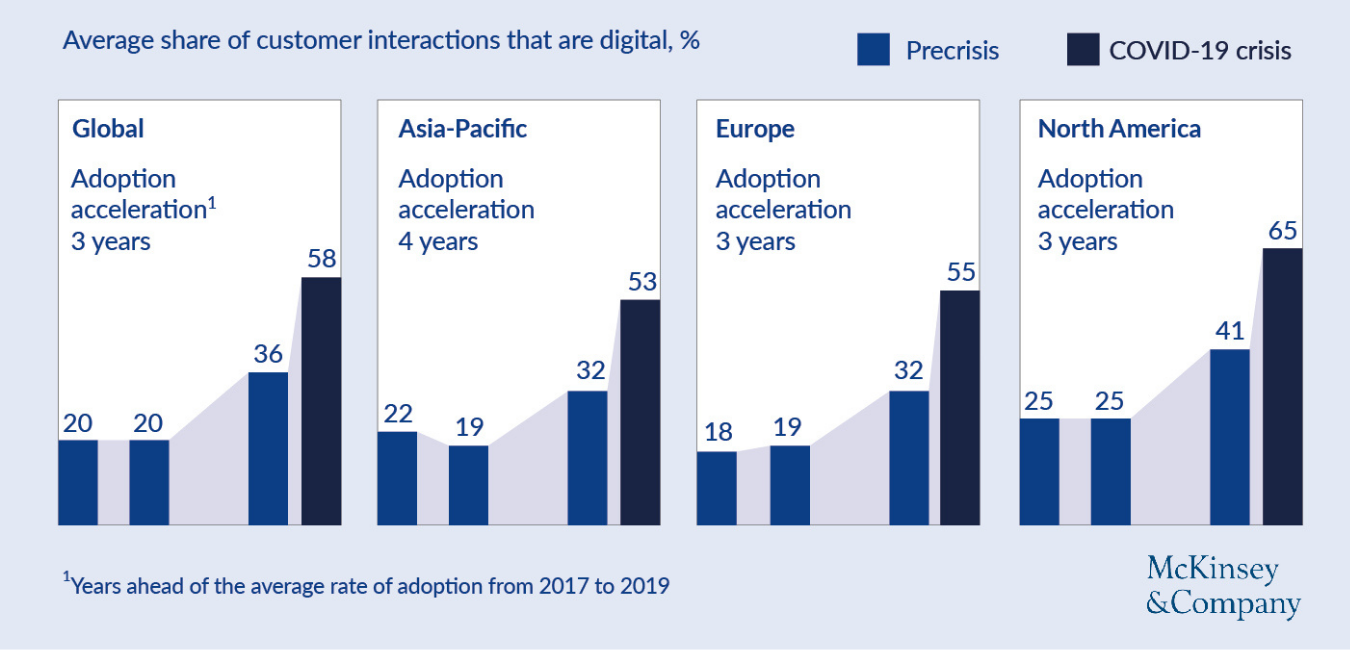
Survival of the fittest - Increasing operational efficiencies and strategising the overall sales process
Besides the demographic changes and developments, additional factors driving the adoption of technology and digital solutions are the tight financial budgets, limited cash flows, and lower staffing levels due to the economic downturn. Plus, a heightened need for all businesses to audit, adjust and improve existing processes to secure overall business performance and profitability. Also, increasing overall cost-efficiencies by looking into how to drive and increase direct sales and reduce the cost of sales drives technology adoption.
Increased competition
A recent report from Meetingsbooker analyzing their platform data states that convention hotels are gradually losing market share in the online meetings reservations market. According to these findings, alternative non-hotel venues, in particular, co-working spaces, locations, and business centers, are now receiving 10% more reservations, accounting for 23% of their total bookings. Besides the competition on the product itself, convention hotels must remain competitive by being easily bookable and guiding the planner through the complex venue sourcing process, i.e., providing electronic RFP (Request For Proposal) and online booking options via white-label solutions integrated on their brand.com.
Customer expectations and behaviour
Timeliness and real-time information
Knowland and ConferenceDirect recently surveyed hundreds of meeting planners. The findings show that the most critical factor impacting planners’ satisfaction is receiving a timely response to requests. Planners won’t wait several hours or days until the hotel comes back to them. As in any other area of life, instant availability of information is an essential requirement by now. Technology can support convention hotels to speed up the sales process by, i.e., automating quote creation and personalizing sales communication by leveraging data, and eventually empowering the buyer to make faster purchasing decisions and secure speedier turnaround for the venue.
Remote site inspections
The times of lengthy, physical site inspections are of the past, not only due to travel restrictions and social distancing protocols but primarily also due to time efficiencies and related cost-cutting measures. Planners want to do initial research, review information regarding the property remotely and online before committing to an in-person site-inspection. Convention hotels can facilitate this online research process by making sure to provide high-quality imagery of the spaces, informative and interactive floor and capacity plans, including available seating options, as well as dynamic visual content such as video and 360° images, 3D content on brand.com and any other relevant channel, and offering the option to take virtual tours of available meeting spaces.
Employee satisfaction - Attract, retain and empower talent in the group sales department
Existing processes should be critically reviewed and optimized by reducing or ideally removing mundane, repetitive, and manual tasks altogether to keep group sales teams motivated, satisfied and thriving.
This frees up valuable time for team members to invest in strategically important tasks, such as defining pricing strategies, designing attractive offers, focusing on customer service, and consulting key leads and prospects for the more complex, larger events.

The new work trend naturally also impacts the group sales teams’ expectations. Providing teams with state-of-the-art tools to help them maximize their productivity and performance makes their working life easier. Flexibility at work is also an important aspect, i.e., allowing team members to manage relevant processes remotely.
What areas in MICE can benefit from tech? What are the use cases, what aspects to consider?
Let’s look into a few concrete opportunities for convention hotels and venues regarding technology and digitalization. What aspects to consider when adopting technology in hotels' MICE and Groups departments? What are the challenges and risks around this for hoteliers and venue operators?
Hybrid & virtual events
A hybrid event combines a physical and a virtual meeting: Some of the delegates are attending physically on-site, while others join remotely using applications such as Zoom, WebEx, or other video conferencing tools.
Hybrid events have a more complex cost structure. Firstly, they require both parties, the planner and the event venue, to manage an overall increased complexity in the planning and execution of the event. Secondly, robust and state-of-the-art event technology is needed to meet the planners' and attendees' expectations. Virtual attendee experience and interaction management are challenging and require additional planning and coordination. Thirdly, numerous stakeholders (i.e., external event technology providers) are usually involved, which adds in cost and complexity.
However, hybrid events allow planners to reach a greater audience from multiple destinations catering to physical and virtual attendees in one event. Convention hotel groups and chains can cater to a higher number of (virtual) attendees without physical space limitations, resulting potentially in overall more revenue returning per event. Suppose it is a hybrid event involving various on-site locations. In that case, multi-property hotel companies have the opportunity to sell multiple properties for one (hybrid) event, provided the geographic locations align with the event concept.
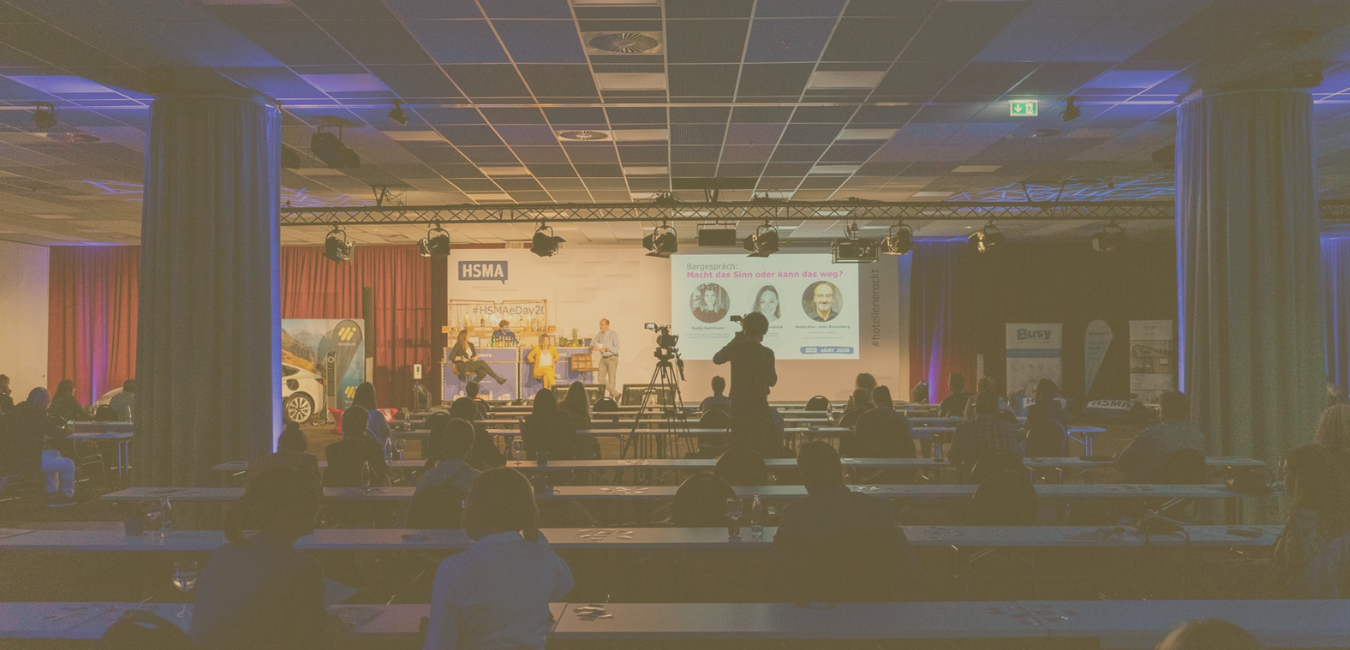
Investing in owning streaming and hybrid event technology on-property is not an option for every hotel. In that case, convention hotels should leverage partnerships with key event technology partners who can provide state-of-the-art technology and expertise on-demand. Another critical aspect to consider when hosting hybrid events is to ensure adequate bandwidth for successful execution.
When planning and executing hybrid events, technologies involved are video conferencing tools, streaming software and equipment, audio & video technology, attendee management, engagement and networking software, hotel's property bandwidth for on-site and off-site attendees, and in case of larger budgets sometimes even hologram technology.
Group & MICE sales process
Why can we purchase anything online today, but booking meetings and events still seems to be such a challenge? Various reasons can be listed, including the fragmented meetings and events space (both on the vendor and buyer side), the complexity of (larger) events and the vast number of stakeholders involved in the sales process, and the lack of standards in terms of data formats.
Watch this [VIDEO] and hear from Alexandra Weber (Lindner Hotels AG) and Felix Undeutsch (hivr.ai) why selling meeting space online is a challenge.
A more straightforward, faster, and smarter sales process is what all stakeholders involved desire. The traditional meetings and events sales process is mundane and primarily manual.
Technology can support convention and group sales teams by automating and optimizing many of these process steps.
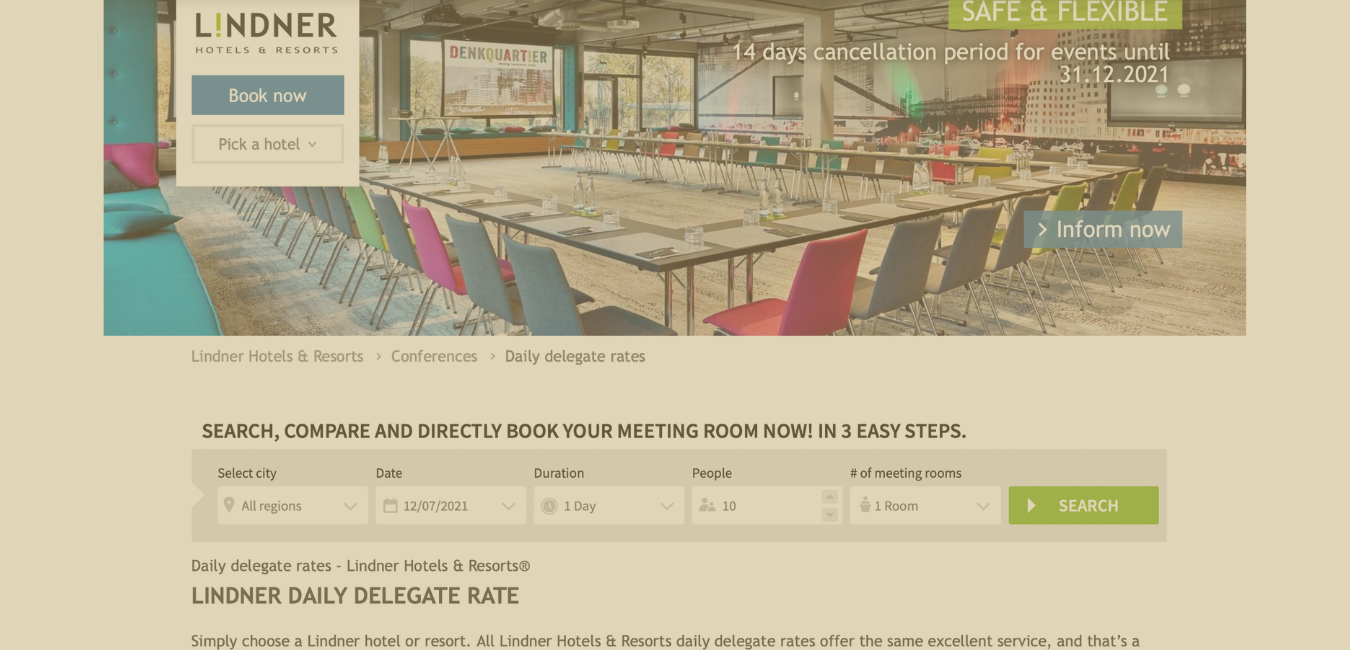
Technology can help automate and improve the initial lead scoring process. Is the incoming RFP desirable business? How to prioritize the incoming requests?
Digitizing the RFP guides the planner through the required steps of a request and guarantees the convention hotel receives all the needed information to design the best offer. Digitizing the sales process speeds up response times to incoming requests. The option to quickly deliver electronic contract documents that can be signed, time-stamped, version-coded, or updated increases the overall chance of converting the business.
Adopting online meeting booking or reservation solutions allows the convention hotel to provide prospects with real-time data, i.e., real-time availability, real-time prices for meeting spaces and hotel rooms, and terms and conditions.
Tracking and reporting is a benefit of digitizing the overall sales process. Group sales teams gain valuable insights into their leads’ behavior and the progress of pending deals. How do the planners interact with proposals received? These insights again facilitate more personalized responses and follow-ups.
Drive direct MICE sales - Online bookings of smaller meetings
According to market data shared by Knowland in a recent COLLECTIVE #MICEbeat live session, smaller meetings are leading the way in the MICE segments' recovery.
In the Asia Pacific region, almost 50% of the meetings are of the size of up to 25 attendees in 2021. In the Middle East, that portion of the overall MICE sales accounts for more than 50%. In the US market, it is 36%. In Europe, the share of smaller meetings with up to 25 attendees accounted for more than 45% in 2019.
By nature, smaller meetings account for less revenue per event when compared to significant, complex events and conventions. However, capturing as many small events as possible can secure a valuable 'standard business' and base income for any convention hotel. Therefore, it's even more critical for convention hotels to design efficient sales processes. Automate wherever possible, allow for online book-ability of smaller meetings, minimize non-value-adding operational costs, and free up valuable team members caught up in outdated MICE sales processes. The time gained is invested better in consulting high-value prospects' for larger, more complex meetings. Smaller meetings are less complex due to fewer parameters to negotiate with meeting planners and fewer stakeholders involved. That represents a great potential to automate and standardize. Consequently, this empowers teams and increases operational efficiency by, i.e., decreasing or even removing time-consuming approval processes.
A prerequisite is a clearly defined pricing per meeting element and general standardised sales guidelines, i.e., predefined combination options of bookable elements (packages) and respective terms and conditions.
Marketing
MICE Content
To be found and considered by potential bookers, being visible online, having a user-friendly, multi-device responsive website, and providing informative online content is essential. This content should include engaging yet truthful visual material, ideally dynamic visual content such as 360° imagery or video content, informative and reader-friendly structured product, service, daily delegate rate (DDR) descriptions, floor plans including available seating options, capacity plans, etc. The content provided on the brand.com website should align with the content supplied to various 3rd party meeting and event space listing, sourcing, and booking platforms, such as, for example, Cvent supplier network, meetago, groups360, meetingsbooker, etc.
Making sure a Search Engine Optimization (SEO) strategy is in place helps to be visible to and found by the right target group online.
Remote site inspections
Virtual site tours are becoming expected capabilities for event venues. Hotels and venues can work with an A/V partner to offer high-quality virtual tours to showcase their property remotely.
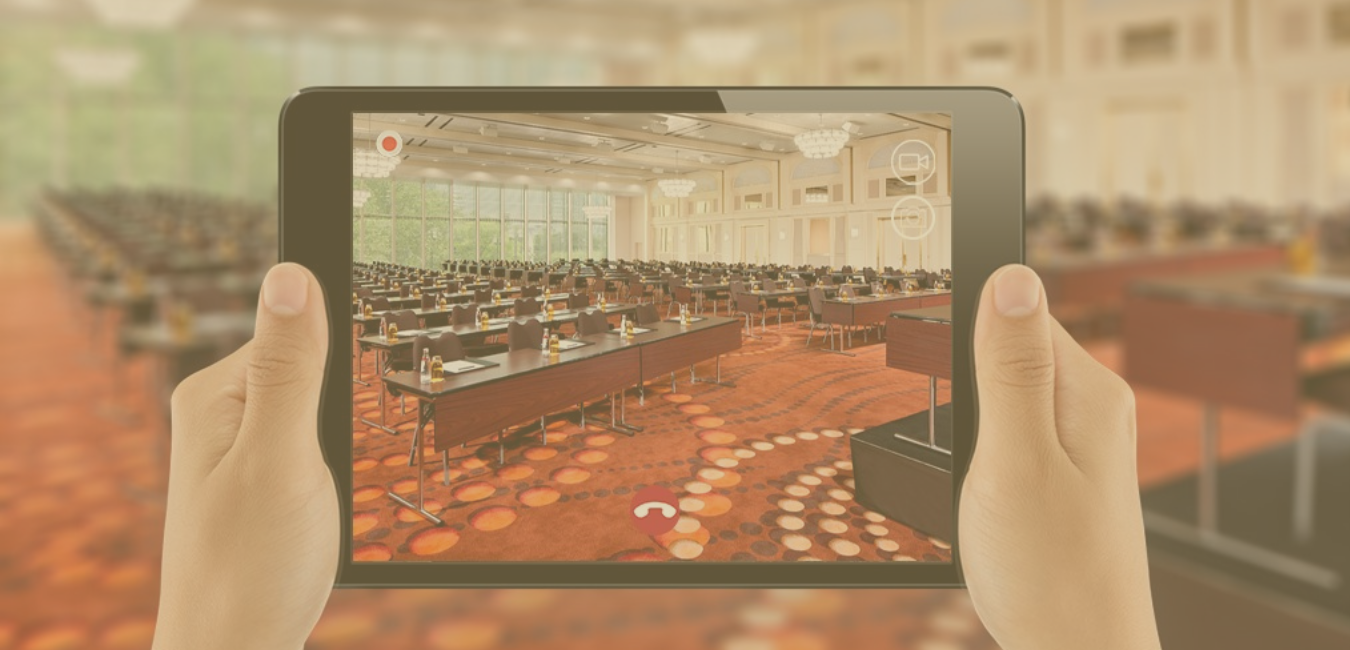
Augmented reality (AR), virtual reality (VR), panoramic and 360° imagery, and 3D tour technology offer alternative options for site tours. Planners can explore a 360° view of the venue and facilities at their convenience. Interactive capacity tables and floorplans, which showcase various seating arrangements and space capacities, are helpful.
Attendees & delegates experience
There are various attendees facing technology solutions available, for example, event apps. A solid mobile event app allows delegates and planners to access information relevant to the event or conference easily.
Apps create a two-way street of communication between the hotel and the guest or planner. The planner can access hotel services when they need them, and the hotel can get in touch with the guest at the right time, even sending targeted notifications, updates, and offers.
Criteria of successful technology adoption in MICE hotels & venues
Technology adoption is not an overnight project but an ongoing, transformational process that is best conducted in stages.
The prerequisite for the efficient use of technology in the meetings and events space is that the hotelier defines the strategy first, i.e. the MICE sales strategy including a solid pricing strategy. Once that is achieved, a reasonable degree of automation and digitization in line with the defined business strategy, business objectives, and estimated return on investment of each step or activity needs to be defined. Existing processes must be reviewed critically. Optimize them, test them, iterate. One of the biggest risks when adopting technology is simply translating existing offline, manual processes into online ones instead of optimizing them before going digital.
Critical to successful technology adoption is, of course, also identifying, selecting, and working with the right partners and vendors.
However, the most crucial factor is to include the executing teams and ensure they understand the benefit of the technology and digital solutions implemented and that they are trained and upskilled accordingly to successfully drive and benefit from the digitalization in the meetings and events department.
About the Author
Lea Jordan, Co-Founder at techtalk.travel

Lea is passionate about curating unbiased industry knowledge and building the leading travel technology community. Together with Rita Machado from Great Hotels of the World, she regularly co-hosts the COLLECTIVE #MICEbeat live think-tanks.
As Senior Convention Director at ITB Berlin Convention, she is in charge of the ITB Marketing & Distribution Day, the Hospitality Technology Forum and advises on all Hospitality Tech-related content.
Before joining techtalk.travel in 2020 as a Co-Founder, Lea was Managing Director of the German Hotel Association, HSMA Deutschland e.V. Lea is a graduate of Business and Hospitality Management from Hotelschool The Hague in the Netherlands.
Also, make sure to find these supporting content elements on MICE & Technology
- VIDEO l Meetings & Event Sales & Technology, co-created with Alexandra Weber (Lindner Hotels AG) and Felix Undeutsch (hivr.ai)
- INFOGRAPHIC l MICE Digitisation & Technology
- PODCAST l Technology & Digital Transformation in MICE & Convention Sales with Katja Reisch (Accor) and Felix Undeutsch (hivr.ai)
-
EXPLORE FURTHER. Related editorials
- Editorial l The modern Hotel Technology Stack
- Editorial l Automation in the Hotel IndustryEditorial l The modern Hotel Technology Stack
- Editorial l Augmented Reality (AR) and Virtual Reality (VR) in Hospitality
- Editorial l Hotel & Guest Apps in Hospitality
To all techtalk.travel editorials.
-
Also, you might find this interesting
- [Video] - The MICE market in transition, trends, and how Accor does it. Interview with Alexandra Weber (Lindner Hotels AG) and Katja Reisch (Accor)
- Recap with [Downloads] and [Videos] - HSMA e & MICE Day 2021
- [Video] - Automate or Die - Why Automation is becoming a Necessity for Survival. Interview with Felix Undeutsch (hivr.ai)
- On-demand [Videos] and [Podcasts] - COLLECTIVE #MICEbeat, informal live think-tanks for the MICE Industry
Images
Virtual Event Scene - Frankfurt Marriott Hotel, Germany
Hybrid Event - HSMA eDay 2020 by HSMA Deutschland e.V./Thomas Loris
Screenshot Lindner Hotels AG website - Book Meetings online (Dec 2021)
Image by Michael Blomkvist, via Pexels
-
Sources
CBI, Centre for the Promotion of Imports from developing countries (CBI) of the Dutch Ministry of Foreign Affairs, Report, September 2021 ‘The European market potential for MICE tourism‘ Sources
Northstarmeetingsgroup.com, November 2021 - 'NYU International Hospitality Investment Conference: Hotel CEOs Predict Record Numbers for 2022'
2021 Planner Survey by Knowland & ConferenceDirect, October 2021
McKinsey, October 2020 - 'How Covid-19 has pushed companies over the technology tipping point'
Meetingsbooker, 2021 - Whitepaper: 'Digitisation of Venue Sourcing'



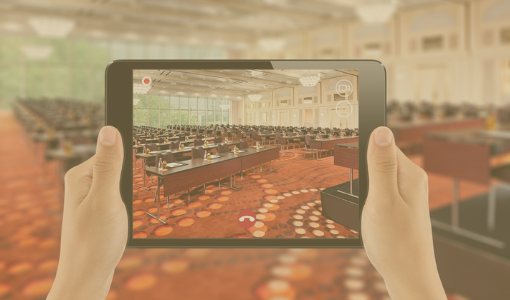
 Free download
Free download
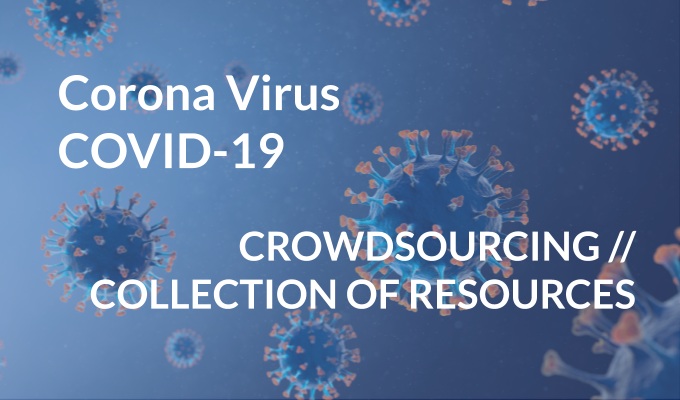
![V03: The History of Hotel & Travel Technology | [Updated] Infographic](https://www.techtalk.travel/storage/app/uploads/public/63f/e6f/ec8/63fe6fec80447817849943.jpg)
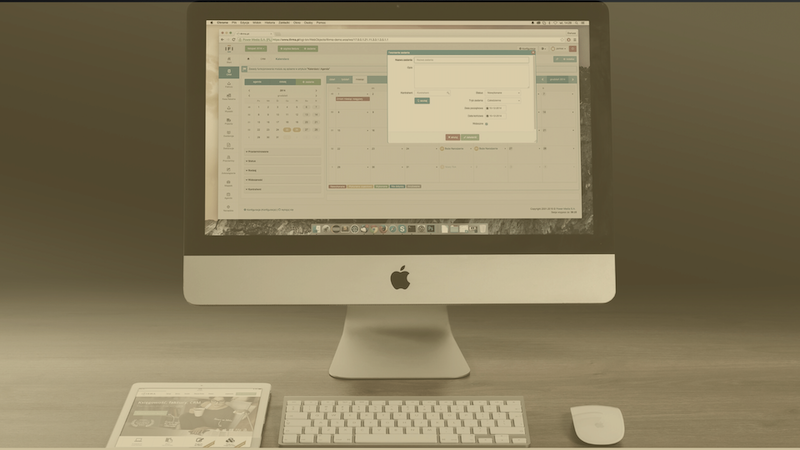
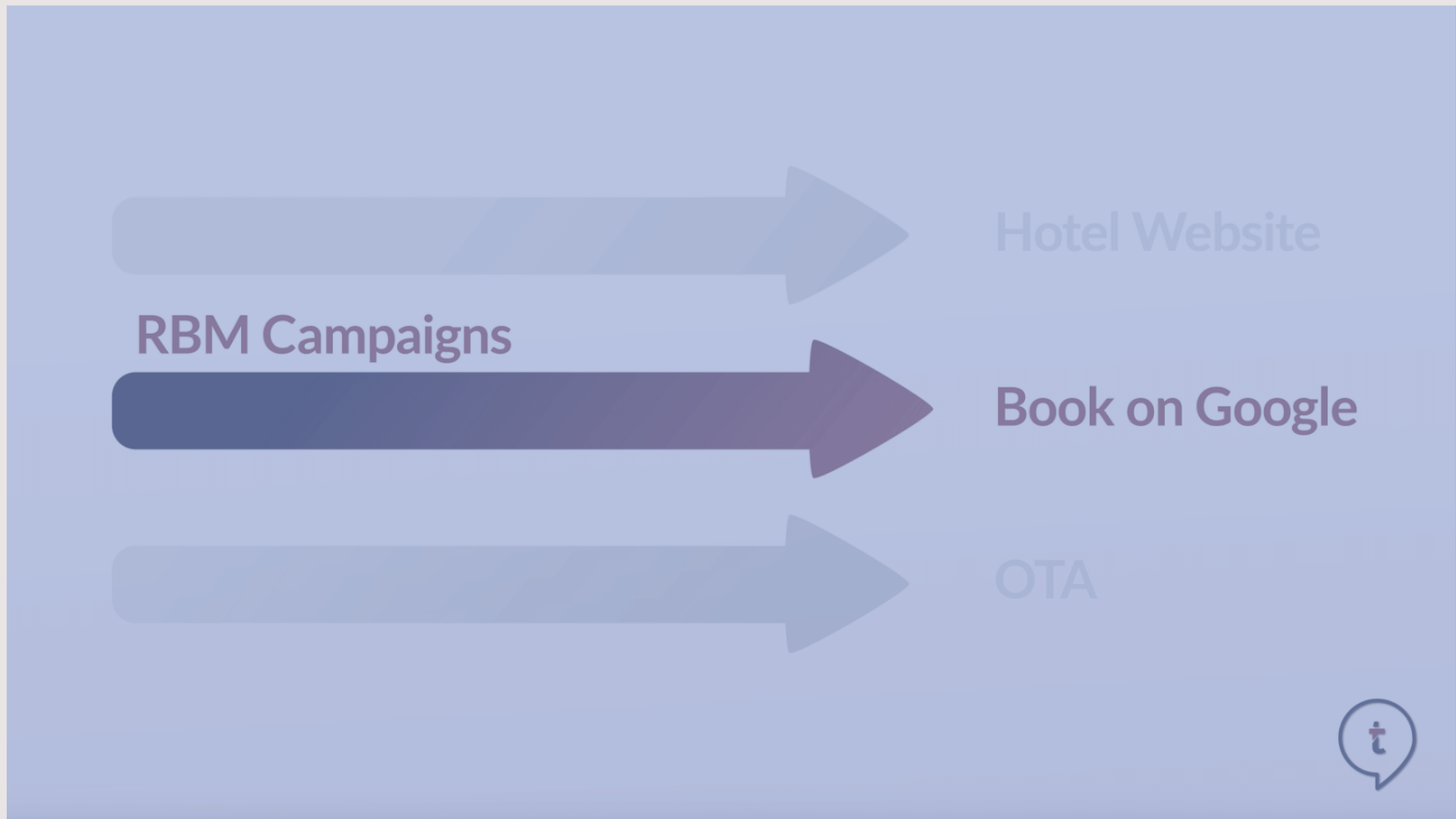

Create an account to access the content.
Get access to Articles, Video's, Podcasts, Think Tanks, Infographics and more.
Click “Sign In” to accept our
Terms of Service Privacy Policy